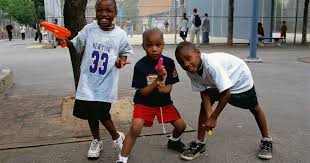
Exploring the Joy of Play: Engaging Children in Creative and Educational Activities
The Importance of Playing for Children
Playing is not just a way for children to pass the time – it is a crucial aspect of their development. Through play, children learn about the world around them, develop essential skills, and build social connections.
One of the key benefits of playing is that it helps children to develop their creativity and imagination. Whether they are building with blocks, pretending to be superheroes, or creating art, play allows children to express themselves in unique ways and explore new ideas.
Play also plays a vital role in helping children develop important cognitive skills. When children engage in imaginative play or solve puzzles and games, they are developing their problem-solving abilities, critical thinking skills, and memory.
Furthermore, playing is essential for physical development. Running, jumping, climbing – all these activities help children build strength, coordination, and balance. Outdoor play especially encourages children to be active and enjoy the benefits of fresh air and sunshine.
But perhaps one of the most significant benefits of playing is its role in fostering social skills. When children play together, they learn how to communicate effectively, cooperate with others, negotiate conflicts, and make friends. Play teaches them about sharing, taking turns, and respecting each other’s boundaries.
In today’s fast-paced world filled with screens and technology, it’s more important than ever to encourage children to engage in unstructured play. By allowing them the freedom to explore their interests and interact with their peers through play, we are setting them up for success in all areas of life.
So next time you see your child playing with their toys or running around in the park with friends, remember that they are not just having fun – they are learning valuable lessons that will shape their future.
Seven Key Tips for Enhancing Your Gaming Experience: Focus, Practice, and Fair Play
- 1. Stay focused and maintain a positive attitude.
- 2. Practice regularly to improve your skills.
- 3. Learn from your mistakes and use them as opportunities to grow.
- 4. Communicate effectively with your team members or opponents.
- 5. Respect the rules of the game and play fairly.
- 6. Stay hydrated and take breaks when needed to avoid fatigue.
- 7. Enjoy the game and have fun!
1. Stay focused and maintain a positive attitude.
When playing, it’s important to stay focused and maintain a positive attitude. By staying focused, you can fully immerse yourself in the activity and make the most of the experience. Whether you’re solving a puzzle, playing a game, or engaging in imaginative play, keeping your attention on the task at hand can enhance your enjoyment and help you achieve your goals. Additionally, maintaining a positive attitude can make playtime more enjoyable and rewarding. A positive mindset can help you overcome challenges, stay motivated, and appreciate the fun and learning opportunities that come with playing. So remember, stay focused and keep a positive attitude to make the most out of your playtime adventures!
2. Practice regularly to improve your skills.
To enhance your abilities and excel in play, it is essential to engage in regular practice sessions. By dedicating time consistently to honing your skills, you can see significant improvement over time. Practice allows you to refine your techniques, build muscle memory, and develop a deeper understanding of the game or activity you are participating in. Whether it’s mastering a musical instrument, perfecting a sport, or excelling in creative pursuits, regular practice is the key to unlocking your full potential and achieving success in your chosen area of play.
3. Learn from your mistakes and use them as opportunities to grow.
Learning from your mistakes is a valuable lesson that playing can teach us. When we make errors or face challenges during play, we have the opportunity to reflect on what went wrong and how we can improve. By embracing our mistakes as learning opportunities, we not only grow and develop our skills but also build resilience and perseverance. Playing provides a safe space to make mistakes, learn from them, and become better equipped to face similar situations in the future.
4. Communicate effectively with your team members or opponents.
When it comes to playing, effective communication with your team members or opponents is key to success. By clearly expressing your ideas, listening to others, and working together towards a common goal, you can enhance teamwork, strategize more effectively, and build stronger relationships on and off the playing field. Whether you’re collaborating on a game plan or resolving conflicts during play, open and respectful communication is essential for a positive and rewarding experience for everyone involved.
5. Respect the rules of the game and play fairly.
When engaging in play, it is important to remember tip number 5: Respect the rules of the game and play fairly. By following the rules and playing with integrity, children learn valuable lessons about sportsmanship, cooperation, and respect for others. Playing fairly not only ensures a level playing field for all participants but also fosters a sense of fairness and justice that carries over into other aspects of life. By honouring the rules of the game, children develop essential social skills and build strong character traits that will serve them well both on and off the playground.
6. Stay hydrated and take breaks when needed to avoid fatigue.
It is important to stay hydrated and take breaks when needed while playing to avoid fatigue. Keeping a water bottle handy and taking regular breaks to rest and re-energize can help children maintain their energy levels and stay focused during playtime. Hydration is key to maintaining physical performance and cognitive function, so encouraging children to drink water throughout their play activities is essential for their overall well-being. Remember, staying hydrated and taking breaks when necessary can help children enjoy their playtime to the fullest!
7. Enjoy the game and have fun!
When it comes to playing, tip number 7 is a simple yet powerful reminder: enjoy the game and have fun! The essence of play lies in the joy and excitement it brings, so remember to immerse yourself fully in the experience. Whether you’re playing a sport, solving a puzzle, or engaging in imaginative play, let go of any worries or stress and focus on the pure enjoyment of the moment. By embracing the fun and laughter that playing brings, you not only enhance your experience but also foster a positive mindset that can benefit you in all aspects of life. So go ahead, dive into the game with enthusiasm and remember to cherish every moment of play!


